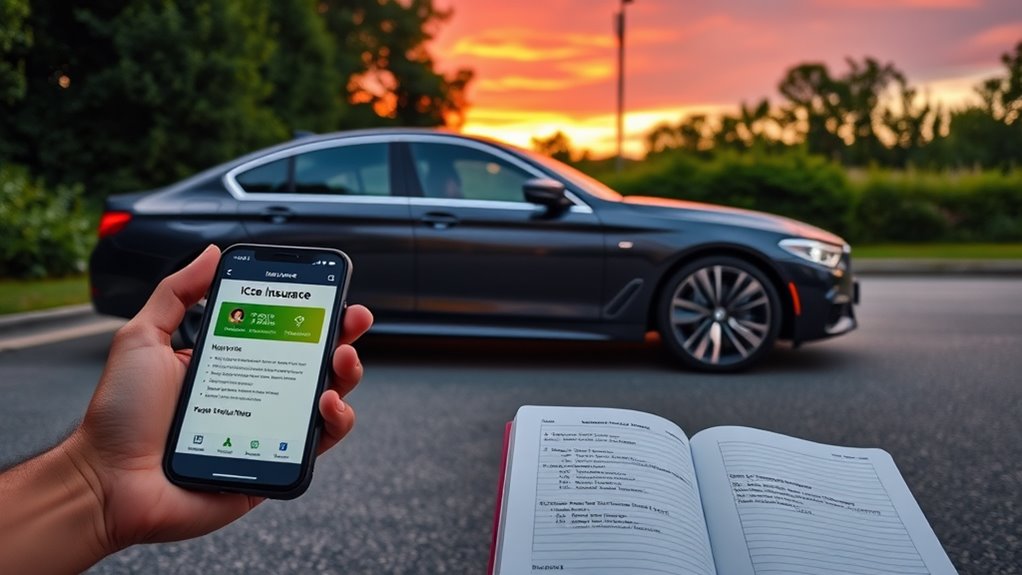Think of occasional driver car insurance as a safety net. You wouldn't want to jump without knowing it's there to catch you. Knowing how to navigate this insurance can save you from unexpected costs and legal headaches. But where do you start? Let's explore five essential tips that can help guarantee you're adequately covered when you hit the road.
Key Takeaways
- Assess your driving frequency to determine if occasional driver insurance suits your needs for adequate coverage.
- Always disclose all licensed drivers in your household to ensure proper coverage and prevent legal issues.
- Consider non-owner car insurance if you frequently borrow or rent vehicles for additional liability protection.
- Regularly review your policy to ensure it reflects your current driving habits and coverage requirements.
- Consult with insurance professionals to customize your coverage and identify potential discounts for occasional drivers.
Understand Your Coverage Needs

When evaluating your coverage needs as an occasional driver, have you considered how often you actually use the vehicle?
If you drive regularly but aren't the primary owner, you might need to add yourself to the insurance policy. This addition typically impacts your premiums, especially if your driving record isn't stellar. It's also important to note that having occasional driver insurance is necessary for anyone regularly driving the car to ensure proper coverage and clarity in insurance claims. Non-owner car insurance can provide protection even when you don't own the vehicle, which is especially beneficial for occasional drivers.
Less experienced drivers, like new license holders, often pose higher risks, which could further raise rates. Remember, your age, gender, location, and even credit score can also influence insurance costs.
Understanding these factors will help you assess your coverage accurately.
Finally, make sure to review policy terms and exclusions to avoid unpleasant surprises in case of an accident.
Disclose All Drivers Accurately
Accurate disclosure of all drivers on an insurance policy is essential to maintaining valid coverage and protecting yourself from potential claim denials. Failing to disclose all drivers can lead to serious consequences, including policy cancellation and increased premiums.
Accurate disclosure of all drivers on your insurance policy is crucial to avoid claim denials and ensure valid coverage.
Here are some best practices to follow:
- List all licensed household members, regardless of how often they drive.
- Conduct annual reviews of your policy to keep driver information current.
- Clearly define primary and occasional drivers to aid risk assessment.
- Provide accurate address and vehicle usage details to your insurer.
- Communicate honestly with your insurance provider to avoid legal troubles.
Explore Non-Owner Insurance Options
If you often find yourself borrowing or renting cars without owning one, exploring non-owner car insurance options can be a smart move. This type of insurance provides essential coverage, including bodily injury and property damage liability, protecting you financially if you cause an accident.
While it won't cover damage to the vehicle you're driving or any injuries you might sustain, it's particularly useful for frequent car borrowers and rental car users. Non-owner insurance can also help maintain your coverage history and meet state requirements, especially if you're classified as a high-risk driver needing SR-22 or FR-44 proof.
Start by researching providers, comparing quotes, and consulting with agents to find the best policy for your needs.
Review Policy Terms Regularly

Borrowing or renting cars can present unique insurance challenges, making it crucial to regularly review your policy terms. By scheduling annual reviews, you can guarantee your coverage aligns with your current needs.
Here are key aspects to focus on:
- Identify Coverage Updates: Make certain you have all necessary coverage types included.
- Assess Risk Factors: Reevaluate factors like your driving frequency and experience.
- Analyze Premium Adjustments: Stay informed about how your profile affects your premiums.
- Maintain Compliance: Confirm your policy meets state insurance requirements.
- Assess Life Changes: Major life events can greatly impact your insurance needs.
Regularly reviewing these elements not only keeps you compliant but helps you avoid unexpected costs and guarantees adequate protection while driving.
Consult With Insurance Professionals
Consulting with insurance professionals can greatly enhance your understanding of car insurance options tailored for occasional drivers. They possess extensive knowledge about specific policies and can help you make informed decisions based on your unique driving habits.
By evaluating your needs, they can customize your coverage to guarantee you're adequately protected while optimizing costs through applicable discounts. Insurance experts also assess risks associated with your occasional driving, guaranteeing appropriate coverage levels.
Additionally, they provide valuable assistance in maneuvering the claims process, making it smoother when you need to file a claim. Engaging with professionals not only clarifies your options but helps you avoid costly mistakes, ultimately securing the best insurance solution for your situation.
Conclusion
Steering through car insurance as an occasional driver can feel overwhelming, yet it doesn't have to be. By understanding your coverage needs and disclosing all drivers accurately, you're protecting yourself against potential pitfalls. Conversely, overlooking these aspects can lead to costly surprises. Whether you're borrowing a friend's car or renting for a weekend trip, exploring non-owner insurance options and consulting with professionals guarantees you're covered. Stay proactive, and you'll drive with confidence, knowing your insurance meets your unique needs.
